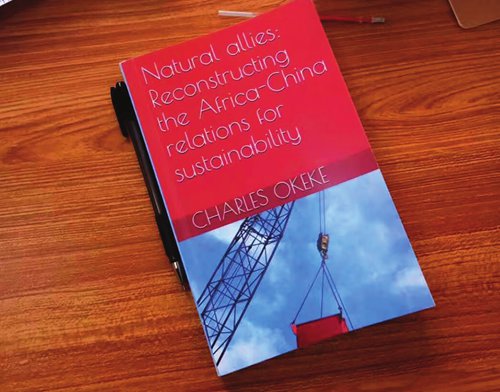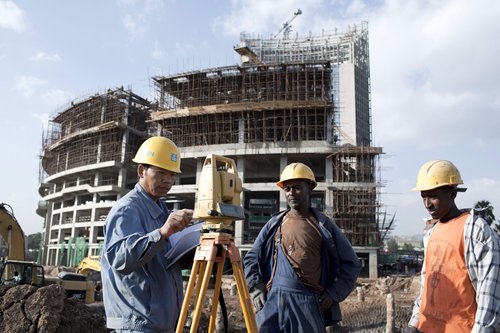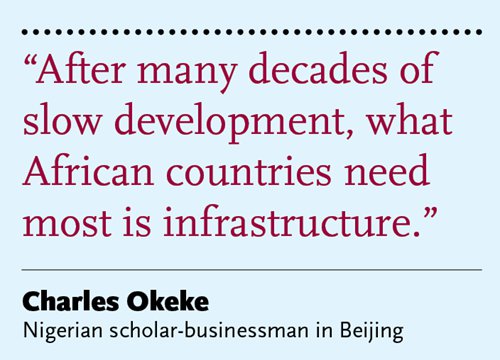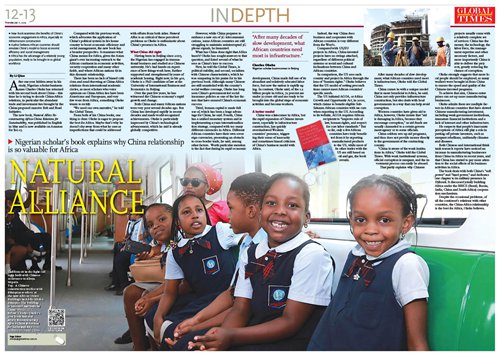HOME >> CHINA
Book explains why China relationship is so valuable for Africa
By Li Qian Source:Global Times Published: 2019/7/10 18:38:41
Nigerian scholar’s book explains why China relationship is so valuable for Africa
○ New book examines the benefits of China's economic engagement in Africa, especially in infrastructure construction
○ Author believes African countries should emulate China's model to boost economic efficiency and social management
○ Africa has the advantage of a relatively young population, ready to be brought in to global workforce

The new book, Natural Allies: Reconstructing Africa-China Relations for Sustainability, was published in English in May and is now available on Amazon for $10.15.
Compared with his previous work, which advocates the application of China's political system in his home country to boost economic efficiency and social management, the new book has a broader perspective. It examines what China means for Africa, given the Asian giant's ever increasing outreach to the African continent in economic activities, security cooperation and many other fields, and where African nations fit in this dynamic relationship.

"We need our own narrative," he told the Global Times.
From both of his China books, one thing is clear: Okeke is eager to propose the best for Africa. Maybe that's why he doesn't shy away from what he sees as imperfections that could be addressed with efforts from both sides. Natural Allies is as critical of these perceived problems as Okeke is enthusiastic about China's presence in Africa.
What China did right
Having been in Beijing since 2005, the Nigerian has engaged in transnational business and studied at a Chinese university. He's had hands-on experience of how things work here, further supported and strengthened by years of academic honing. Right now, in his 40s, Okeke is a PhD candidate of law at the University of International Business and Economics in Beijing.
Over the past few years, he has witnessed the Chinese economy's rapid growth and change.
Both China and many African nations were very poor several decades ago. But China has developed rapidly in recent decades and made world-recognized achievements. Okeke is particularly impressed by China's technological advancement, which he said is already globally competitive.
However, while China prepares to embrace a new era of 5G telecommunications, some African countries are still struggling to maintain uninterrupted 3G phone signals, he lamented.

First, he told the Global Times, is political stability, and second, socialism with Chinese characteristics, which he was unsparing in his praise for in his previous book. Although many Chinese are still unsatisfied with the country's social welfare coverage, Okeke has long seen China's government-led social insurance policies as one of the key factors that have ensured China's economic success.
Third, human capital is made full use of, which has been a huge advantage for China, he said. Fourth, China has a unified monetary system and is implementing a yuan internationalization strategy, compared with too many different currencies in Africa. Different African countries have their own sovereign currencies, presenting an obstacle to cross-border trade, he said, among other factors. Worth particular mention is the fact that during its rapid economic development, China made full use of its abundant and relatively educated labor force, but now the nation is rapidly aging. In contrast, Okeke said, of the 1.2 billion people in Africa, 72 percent are under 30 years old and are ready to be brought into the global stage of economic activities and become workers.
A better model
China was a latecomer in Africa, but the rapid expansion of Chinese investment, especially in infrastructure construction, has quickly overshadowed Western countries' presence, triggering their sense of insecurity and sometimes biased criticism of China's business model with Africa.
Indeed, the way China does business and cooperates with African countries is very different from the West's.
Compared with US/EU projects in Africa, China-invested projects have no strings attached, regardless of different political systems or social and cultural inclinations between China and African countries.
In comparison, the US sees each country and project in Africa through the lens of "human rights." Okeke believes that the US model of setting preconditions cannot meet African countries' specific needs.
The US initiated AGOA, or Africa Growth and Opportunity Act, in 2000, which claims to benefit eligible Sub-Saharan African countries with tax cuts when exporting to the US. According to its website, AGOA requires African recipients to "improve rule of law, human rights, and respect for core labor standards." But so far, only a few African countries have truly benefitted from it by exporting manufactured products to the US, while most of its other trades with the US are still based on oil and gas, the book reveals.
After many decades of slow development, what African countries need most is infrastructure, Okeke told the Global Times.
China comes in with a unique model that is more beneficial to Africa, he said. China not only provides infrastructure construction, but also deals with local governments in a way that can help avoid corruption.
Western countries have given aid to Africa, however, Okeke insists that "aid is damaging in Africa, because they encourage corruption," as aid funds are usually channeled to a certain government agency or to some officials.
China seldom sets up aid programs, and thus does not provide money directly to the government of the contracting country.

That partly explains why Chinese projects usually come with a relatively complete set of services: China has the money, the technology, the labor force, the management expertise and other necessary factors, and more importantly China is able to deliver the projects, greatly reducing the chance of corruption.
Okeke strongly suggests that more local people should be employed, as many workers were brought in from China to ensure the speed and quality of the Chinese-invested programs.
To achieve that aim, Chinese enterprises can set up more manufacturing businesses.
Okeke admits there are multiple factors in African countries that have slowed Chinese manufacturing investment, including weak government institutions, immature financial institutions and a lack of internet and other infrastructure.
He suspects that people's inaccurate perceptions of Africa still play a role in putting off private investors, such as rampant rebellions, unfriendly climates and diseases.
Both Chinese and international think tank research reports have noticed an increase in manufacturing businesses from China in Africa in recent years, and that China has started to pay more attention to the social effects of its business activities in Africa.
The book deals with both China's "soft power" and "hard power," and dedicates one chapter to its military presence in Djibouti. It discussed jointly building Africa under the BRICS (Brazil, Russia, India, China and South Africa) cooperation mechanism.
Despite the occasional problems, of all the continent's relations with other countries, the China-Africa relationship is the best for Africa, Okeke believes.

Newspaper headline: Natural alliance
○ Author believes African countries should emulate China's model to boost economic efficiency and social management
○ Africa has the advantage of a relatively young population, ready to be brought in to global workforce

Children sit in the light rail train built with Chinese assistance in Abuja, Nigeria. Photo: VCG
After one year hidden away in his study, Nigerian scholar-businessman Charles Okeke has returned with his second book about China - this time he is trying to decode China-Africa relations, in particular the abundant trade and investment ties brought by the China-proposed massive Belt and Road Initiative.The new book, Natural Allies: Reconstructing Africa-China Relations for Sustainability, was published in English in May and is now available on Amazon for $10.15.
Compared with his previous work, which advocates the application of China's political system in his home country to boost economic efficiency and social management, the new book has a broader perspective. It examines what China means for Africa, given the Asian giant's ever increasing outreach to the African continent in economic activities, security cooperation and many other fields, and where African nations fit in this dynamic relationship.

Charles Okeke's new book Natural Allies: Reconstructing Africa-China Relations for Sustainability Photo: Courtesy of Charles Okeke
There has been no lack of biased criticism and mud-throwing at China-Africa relations from international academic circles, as most scholars who voice opinions on China-Africa ties have been Americans and Europeans, and very few were from Africa, something Okeke wants to rectify."We need our own narrative," he told the Global Times.
From both of his China books, one thing is clear: Okeke is eager to propose the best for Africa. Maybe that's why he doesn't shy away from what he sees as imperfections that could be addressed with efforts from both sides. Natural Allies is as critical of these perceived problems as Okeke is enthusiastic about China's presence in Africa.
What China did right
Having been in Beijing since 2005, the Nigerian has engaged in transnational business and studied at a Chinese university. He's had hands-on experience of how things work here, further supported and strengthened by years of academic honing. Right now, in his 40s, Okeke is a PhD candidate of law at the University of International Business and Economics in Beijing.
Over the past few years, he has witnessed the Chinese economy's rapid growth and change.
Both China and many African nations were very poor several decades ago. But China has developed rapidly in recent decades and made world-recognized achievements. Okeke is particularly impressed by China's technological advancement, which he said is already globally competitive.
However, while China prepares to embrace a new era of 5G telecommunications, some African countries are still struggling to maintain uninterrupted 3G phone signals, he lamented.

A Chinese construction worker with Ethiopian workers at the new African Union Buildings in Addis Ababa, Ethiopia. The building is invested and built by China. Photo: VCG
What has China done right that Africa hasn't? Okeke has sought answers to that question, and listed several of what he sees as China's keys to success.First, he told the Global Times, is political stability, and second, socialism with Chinese characteristics, which he was unsparing in his praise for in his previous book. Although many Chinese are still unsatisfied with the country's social welfare coverage, Okeke has long seen China's government-led social insurance policies as one of the key factors that have ensured China's economic success.
Third, human capital is made full use of, which has been a huge advantage for China, he said. Fourth, China has a unified monetary system and is implementing a yuan internationalization strategy, compared with too many different currencies in Africa. Different African countries have their own sovereign currencies, presenting an obstacle to cross-border trade, he said, among other factors. Worth particular mention is the fact that during its rapid economic development, China made full use of its abundant and relatively educated labor force, but now the nation is rapidly aging. In contrast, Okeke said, of the 1.2 billion people in Africa, 72 percent are under 30 years old and are ready to be brought into the global stage of economic activities and become workers.
A better model
China was a latecomer in Africa, but the rapid expansion of Chinese investment, especially in infrastructure construction, has quickly overshadowed Western countries' presence, triggering their sense of insecurity and sometimes biased criticism of China's business model with Africa.
Indeed, the way China does business and cooperates with African countries is very different from the West's.
Compared with US/EU projects in Africa, China-invested projects have no strings attached, regardless of different political systems or social and cultural inclinations between China and African countries.
In comparison, the US sees each country and project in Africa through the lens of "human rights." Okeke believes that the US model of setting preconditions cannot meet African countries' specific needs.
The US initiated AGOA, or Africa Growth and Opportunity Act, in 2000, which claims to benefit eligible Sub-Saharan African countries with tax cuts when exporting to the US. According to its website, AGOA requires African recipients to "improve rule of law, human rights, and respect for core labor standards." But so far, only a few African countries have truly benefitted from it by exporting manufactured products to the US, while most of its other trades with the US are still based on oil and gas, the book reveals.
After many decades of slow development, what African countries need most is infrastructure, Okeke told the Global Times.
China comes in with a unique model that is more beneficial to Africa, he said. China not only provides infrastructure construction, but also deals with local governments in a way that can help avoid corruption.
Western countries have given aid to Africa, however, Okeke insists that "aid is damaging in Africa, because they encourage corruption," as aid funds are usually channeled to a certain government agency or to some officials.
China seldom sets up aid programs, and thus does not provide money directly to the government of the contracting country.

"China is aware of the weak institutions in Africa," Okeke told the Global Times. With weak institutional systems, official corruption is rampant, and the investment process can easily be abused.
That partly explains why Chinese projects usually come with a relatively complete set of services: China has the money, the technology, the labor force, the management expertise and other necessary factors, and more importantly China is able to deliver the projects, greatly reducing the chance of corruption.
Okeke strongly suggests that more local people should be employed, as many workers were brought in from China to ensure the speed and quality of the Chinese-invested programs.
To achieve that aim, Chinese enterprises can set up more manufacturing businesses.
Okeke admits there are multiple factors in African countries that have slowed Chinese manufacturing investment, including weak government institutions, immature financial institutions and a lack of internet and other infrastructure.
He suspects that people's inaccurate perceptions of Africa still play a role in putting off private investors, such as rampant rebellions, unfriendly climates and diseases.
Both Chinese and international think tank research reports have noticed an increase in manufacturing businesses from China in Africa in recent years, and that China has started to pay more attention to the social effects of its business activities in Africa.
The book deals with both China's "soft power" and "hard power," and dedicates one chapter to its military presence in Djibouti. It discussed jointly building Africa under the BRICS (Brazil, Russia, India, China and South Africa) cooperation mechanism.
Despite the occasional problems, of all the continent's relations with other countries, the China-Africa relationship is the best for Africa, Okeke believes.

Newspaper headline: Natural alliance